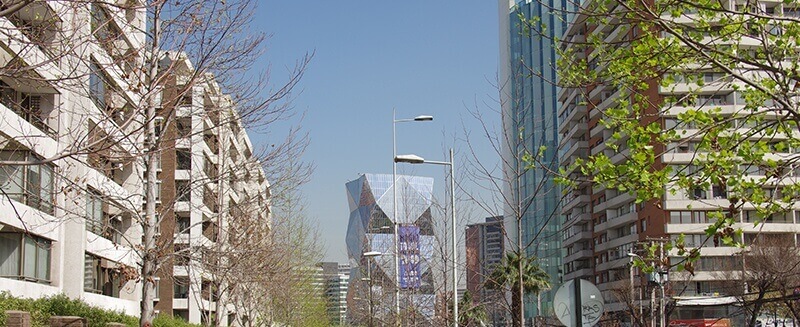
- Home
- Expat Guide
- Accommodation in Chile
Last updated on 11/08/2025
Finding your home in Chile
When arriving in Chile, securing suitable accommodation is one of your most important priorities. Many newcomers start with temporary accommodation in Santiago while they search for a permanent home. This initial period allows you to explore different neighborhoods and understand the local rental market before making a long-term commitment.
For those seeking long-term rental accommodation, the process involves several key considerations. Our comprehensive guide on finding an apartment or house in Santiago walks you through the entire rental process, from understanding legal requirements to navigating the application process. Location is crucial, and our detailed analysis of apartments for rent in Santiago helps you choose the right neighborhood based on your lifestyle, budget, and commute needs. If you prefer more space and privacy, our guide to houses for rent in Santiago explores the best neighborhoods for family living. To address common concerns and questions, we've compiled comprehensive frequently asked questions about renting in Chile, covering everything from deposit requirements to tenant rights.
Students, interns, and budget-conscious expats often benefit from shared accommodation arrangements. Our guide on how to share a flat and find flatmates provides practical advice on finding compatible roommates and navigating shared living situations in Chile.
Chile Real Estate
For foreigners interested in property ownership, Chile offers attractive investment opportunities with relatively straightforward processes for international buyers. Our step-by-step guide to buying property in Chile covers legal requirements, financing options, and the complete purchase process from initial search to final registration. If you already own property and are considering selling, our comprehensive frequently asked questions about selling property in Chile addresses common concerns about market conditions, legal procedures, and tax implications. For those looking at real estate as an investment vehicle, our analysis of real estate investing in Chile explores market trends, investment strategies, and potential returns across different property types and regions.
Frequently asked questions about accommodation in Chile
Finding and Renting Accommodation
You need several key documents: Valid RUT/RUN (Chilean ID), proof of income (last 3 pay stubs or employment contract), bank statements, personal references, and sometimes a guarantor. Tourist visa holders face challenges as most landlords prefer residents with RUT numbers.
Typically 1-2 months' rent as deposit plus the first month's rent upfront. Some premium properties may require up to 3 months' deposit. The deposit is refundable at the end of the lease, minus any damages.
Popular rental websites include: Portal Inmobiliario, Yapo.cl, Toctoc.com, and CompartoDpto (for shared accommodation). Facebook Marketplace and expat Facebook groups are also valuable resources, especially for furnished rentals.
Furnished rentals are ideal for expats planning shorter stays (under 2 years) or those who prefer convenience. Unfurnished properties are cheaper monthly and better for long-term residents. Furnished properties typically cost 20-30% more than unfurnished.
Costs and Payments
Common additional costs include: Gastos comunes (HOA fees, 30-150 USD monthly), utilities (electricity, water, gas - 50-120 USD monthly), internet (25-35 USD), and building insurance. Total additional costs typically add 15-25% to your base rent.
Yes, negotiation is often possible, especially for longer lease terms (12+ months), paying multiple months upfront, or in areas with high vacancy rates. Market conditions, property condition, and your profile as a tenant all affect negotiating power.
It varies by property type. Furnished apartments for expats sometimes include utilities, while unfurnished long-term rentals typically exclude them. Always clarify what's included before signing. Gastos comunes (building fees) are usually separate.
Legal and Practical Considerations
Key tenant rights include: Peaceful enjoyment of the property, advance notice for landlord visits (usually 24 hours), return of deposit minus legitimate damages, and protection against arbitrary rent increases during fixed-term leases.
Most residential leases are 12 months minimum, with many landlords preferring 24-month terms. Short-term furnished rentals (3-6 months) are available but limited and more expensive. Breaking a lease early typically requires 60 days notice and may involve penalties.
Yes, foreigners can own property with some restrictions. There are limitations near borders and coasts, and you'll need a RUT number. The purchase process is similar to locals but requires additional documentation and legal assistance.
First, communicate in writing with your landlord. For serious issues, contact SERNAC (consumer protection agency) or seek legal advice. Document all interactions and keep copies of payments and correspondence.

Do you want to go more in detail?
I wrote the Chile Handbook for Foreigners for anyone and everyone looking to move permanently and enjoy life in Chile. It's a 265-page book that goes over all aspects of relocating to Chile. Here is what you get:
✅ Practical tips based on 7-year relocation experience
✅ To-do lists to help you start
✅ Last updated in 2025

